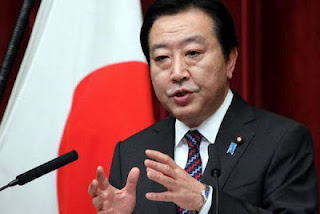Japan close to restarting reactors
 Japan’s prime minister Yoshihiko Noda got some wind in his sails in efforts to restart the nation’s shut down nuclear reactors this week.
Japan’s prime minister Yoshihiko Noda got some wind in his sails in efforts to restart the nation’s shut down nuclear reactors this week. Osaka Mayor Toru Hashimoto, a high profile opponent of the the government’s efforts to plug the reactors back into the grid, reversed his position.
The populist mayor said that with the onset of summer heat, and the likelihood of rolling blackouts, keeping the reactors shut down no longer makes any sense.
What also might have helped him change his mind is the government’s velvet glove / iron fist message that cities that had running reactors would be spared rolling blackouts. July and August temperatures average in the upper 80s. A vision of the city’s sealed window apartment towers sweltering in summer heat must have looked like a sure path to a recall election or even social unrest. Chalk up access to air conditioning as a key factor in urban politics.
PM Noda also has had some success convincing provincial government officials to support restarting reactors by promising to place high level METI agency managers at the restarted reactor sites. Frankly, the message here from Noda seems to be, “if my guys will go to the reactors, what is your problem with restarting them?”
Another step Noda is taking is to kick start the stalled negotiations in the Diet, the Japanese parliament, to yank the compromised Nuclear Industrial Safety Agency out of its conflicted home at METI and make it an independent nuclear safety organization.
Goshi Hoshono, PM Noda’s point man on all things nuclear, has reportedly been making progress with this message in his meetings with local governments that have de-facto veto power over restart of the reactors.
One of the ironies of the campaign to restart the reactors is that METI chief Yukio Edano, who was a spokesman for the previous PM Naoto Kan, is now tasked with getting the reactors going again and coming up with a plausible energy policy. Kan has been making the rounds trying to justify his micro managing meddling with TEPCO in the early days of the crisis and his subsequent calls for permanent closure of all of Japan’s reactors.
Edano has waffled on his personal commitment to restart and maintain the fleet long term. Yet, in his role as METI chief which significant government responsibilities for the nation’s economy, has pushed reactor restarts at least for the short-term.
Perhaps the best illustration of how progress is being made is a report that the governor of Fukui Province, Issei Nishikawa, convened a panel of nuclear experts to “advise” him on whether the Ohi plant reactors should be restarted.
This is a patent search for political air cover from technocrats and a face saving maneuver if ever there was one. He needs it because the Fukushima crisis severely eroded public trust in the government at all levels on the issue of nuclear energy.
You can blame former PM Kan and TEPCO for that, and history may show that current PM Noda will earn points for leadership in fixing the problem.
Japanese Energy Committee Proposes Four Policy Options
30 May (NucNet): A Japanese government committee studying the country’s long-term energy alternatives following the Fukushima-Daiichi nuclear accident has listed four options in its final recommendations – from a total phase-out of nuclear energy to maintaining a reliance on nuclear for the foreseeable future, the Japan Atomic Industrial Forum (JAIF) has confirmed.
JAIF said the committee is expected to submit its report to an umbrella panel soon. The four options are:
• A complete phase-out of nuclear power while raising renewable energy sources to 35 percent of energy supply by 2030;
• Significantly reducing nuclear power to 15 percent of the total supply by 2030, while increasing renewable energy to 30 percent, then deciding what the future energy mix should be;
• Agreeing on a lower level of nuclear power generation capacity of about 20-25 percent of total energy supply;
• Letting the free market determine what the appropriate energy mix should be.
The panel dropped a fifth option of maintaining nuclear power at its previous level of around 35 percent of all output estimated for 2030.
The 25-member panel cautioned that there are potentially serious consequences for the economy with some of the options.
It said that under the most drastic scenario – phasing out all nuclear by 2030 – real gross domestic product would be cut by as much as five percent compared with a full restoration of nuclear energy.
You can return to the main Market News page, or press the Back button on your browser.

